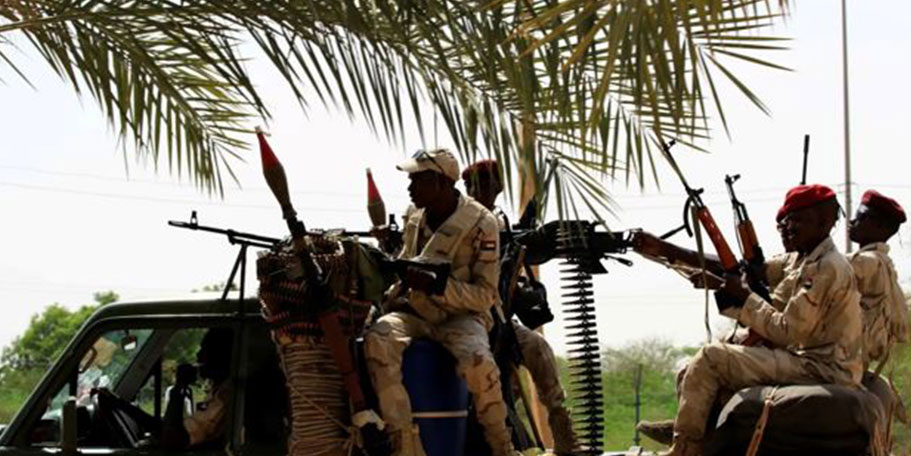
By: nihad Mustafa
Eritrea has emerged as a new gateway for smuggling weapons to the government forces in Port Sudan, according to media reports revealing the arrival of a military supply shipment that includes anti-aircraft systems, barrel bombs, and spare parts.
This came following reports that former Sudanese intelligence chief Salah Gosh visited Eritrea on May 16 and met with its president, Isaias Afwerki. The two reportedly agreed to use Asmara as a front for purchasing weapons on behalf of Port Sudan’s forces and allied militias, utilizing Eritrean ports for transport.
Salah Gosh is well-known for his involvement in arms deals and trafficking and is often referred to as “Sudan’s strongman” due to his long history of service under the regime of ousted president Omar al-Bashir. Since the regime’s fall in 2019, his influence has grown, bolstered by his alliance with Abdel Fattah al-Burhan’s forces and his role as a mediator in weapons smuggling.
Information suggests that Turkish and Iranian drones are being delivered to Port Sudan through Asmara Airport in Eritrea. Reports indicate increased support from Ankara and Tehran to Burhan’s forces, including Turkish Bayraktar TB2 drones and Iranian Mohajer-6 drones, which are capable of carrying precision-guided bombs.
A shipment of military supplies from Eritrea—including anti-aircraft weapons, barrel bombs, and spare parts—has arrived in Port Sudan in clear violation of UN resolutions prohibiting arms deliveries to either side in the Sudanese conflict.
Since the war in Sudan began in April 2023, Eritrea has become a vital supply route to the extent that traders can no longer meet the demand, according to a previous AFP report. While such operations were initially conducted informally between Port Sudan forces and smugglers, they have since shifted to a more official level over the past two years.
The growing cooperation between Eritrean authorities and the de facto government in Sudan is not limited to arms transfers and port usage. Media reports have revealed rapid political and military developments, including claims that Burhan’s forces have moved warplanes to Asmara as a precautionary measure following a series of drone strikes on civilian and military sites in Port Sudan since May 4.
Burhan’s decision to relocate aircraft to Eritrea followed heavy aerial bombardments, prompting authorities to take measures to safeguard military assets amid fears of potential escalation, particularly given the significant advances made by the Rapid Support Forces (RSF) in recent weeks.
These developments underscore Eritrea’s increasing support for Burhan’s forces, including the deployment of warships along Sudan’s coast and the hosting of Sudanese fighter jets at Eritrean airports. Eritrea is also reportedly training thousands of fighters from Darfuri armed movements, who later joined the so-called “Joint Force” fighting alongside Port Sudan forces in Kordofan and Darfur.
Such developments are expected to strain Eritrea’s already tense relationship with Ethiopia. Addis Ababa insists on its “legitimate right” to access the Red Sea, particularly through Eritrea’s Assab Port, which Asmara considers a “symbol of national sovereignty” and refuses to negotiate over.
A similar escalation occurred in July 2024, when Eritrea deployed naval vessels along Sudan’s coast—a move Ethiopia deemed a serious provocation that led to a deterioration in bilateral relations.
Ties between Asmara and the Port Sudan government have grown significantly throughout the two years of conflict, with Burhan visiting Eritrea multiple times, the latest being an unannounced visit in April.
Observers note that the presence of Eritrean naval forces in Port Sudan at this critical time is a signal of at least symbolic support for the Sudanese army in its fight against the RSF.
Meanwhile, Port Sudan’s forces continue to stockpile weapons. Earlier reports revealed that Burhan’s army is actively searching for “safe” locations to store the large quantities of weapons it has amassed over recent months, including tanks, drones, and missiles—many of which were supplied by Iran’s Islamic Revolutionary Guard Corps.
Multiple reports confirm that Port Sudan forces have built tunnels within several military bases to protect strategic weapons and drones acquired recently. These include advanced defense systems, surveillance equipment, and radar technologies brought in by Burhan’s forces to counter RSF drones.
The newly constructed tunnels are intended to safeguard the army’s strategic arsenal for decades, enable systematic storage, and enhance security—addressing vulnerabilities exposed when the army lost numerous depots following the outbreak of war on April 15, 2023.
Disclaimer: the views and claims expressed in this article are those of the author and do not reflect the stand of the publisher.
.
.
.
#Eritrea #Supply #Route #Burhans #Forces
Source link











